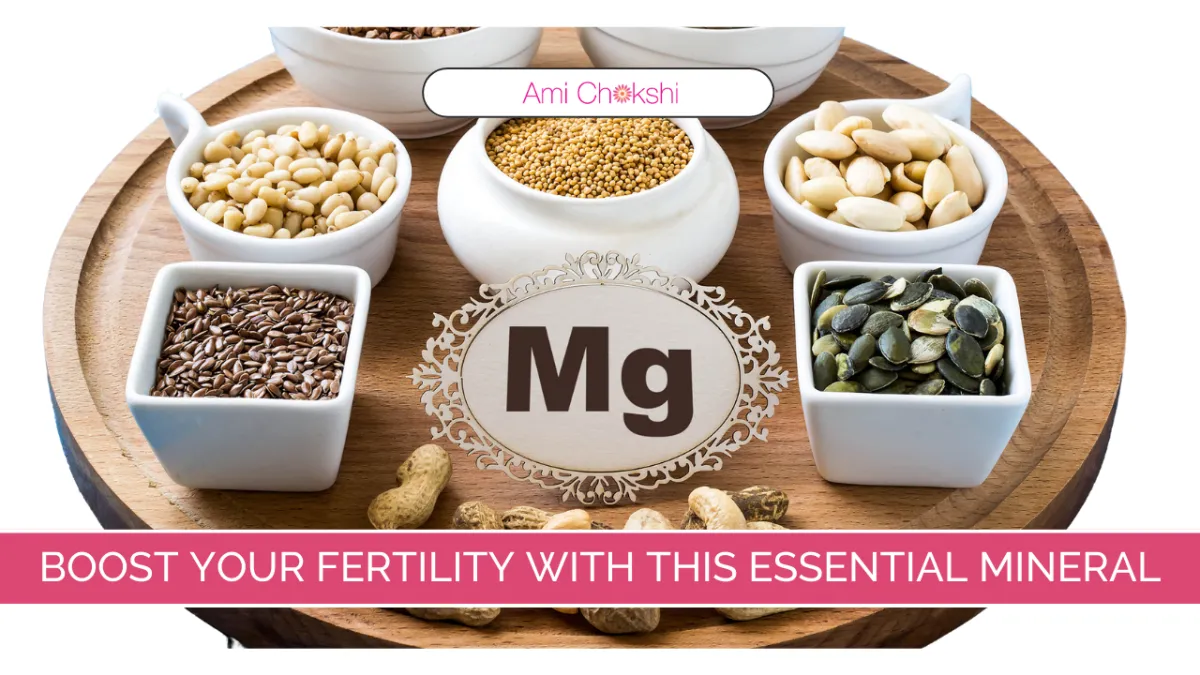
Boost Your Fertility with This Essential Mineral
Do you crave chocolate in the second half of your cycle?
Does stress have a constant presence?
Are caffeine and sugar staples on your weekly meal plan and shopping list?
If you answered yes to any of these, you likely need magnesium.
Magnesium is an essential mineral for health and fertility. It is involved in over 300 enzymatic reactions in the body.
It supports chemical reactions in the body, helps detoxify fertility muggers through your liver, and is responsible for converting the food you eat into cellular energy.
Magnesium is life-enhancing, but if you don't have it becomes life-threatening.
Most Americans – around 80% - are deficient in magnesium.
Because the Western diet is so focused on grains and processed foods, most of the magnesium in the grains is lost when food is processed.
Eating refined sugar also depletes magnesium.
In The Women's Health Study at Harvard, where 17,000 women participated, those who ate a high-carbohydrate diet were considered more infertile than those who ate fewer sugars.
These high-sugar diets are responsible for increased insulin resistance, often seen in women with PCOS, and can lead to ovulatory dysfunction.
Magnesium-rich diets help preserve insulin sensitivity and ovulatory function.
Because magnesium is responsible for many functions, ensuring you have enough magnesium in your diet has numerous benefits.
Magnesium supports stress and sleep.
When you are trying to conceive and not having success, I know how stressful it can be, and your sleep may be affected, too.
Stress can deplete magnesium, so having enough support lowers anxiety because it's a powerful relaxation mineral.
It controls your cortisol levels, so your insulin levels do not spike, which drops your blood sugar.
I teach my fertility clients the importance of keeping their blood sugar stable. Steady blood sugar ensures that energy is constantly flowing to their cells.
Taking magnesium before bed can also help you get a restful night's sleep, which is the most critical lifestyle component to optimal fertility.
Magnesium helps balance fertility hormones progesterone and estrogen.
Magnesium controls follicle-stimulating hormone, or FSH, because estrogen depends on magnesium status, and FSH is the hormone that stimulates the ovaries.
Low magnesium can also signal low progesterone levels, leading to short luteal phases and increased miscarriage risk.
Finally, for those of you who struggle with PMS, magnesium should become your friend.
Magnesium levels fall before your period, so ensuring enough magnesium helps you produce serotonin and feel good.
Magnesium also helps decrease inflammation.
If you are trying to conceive with IVF, having a diet rich in magnesium can improve your chances of a successful embryo transfer because you're lowering your overall inflammation and increasing your chances of implantation.
Magnesium is anti-aging.
Fertility is often about turning back the clock; magnesium can help with this. When your body is deficient, it ages at an accelerated rate.
Many of you may take CoQ10 to support your cellular health, including eggs and sperm cells. While CoQ10 supports egg quality, it is responsible for only one of eight steps related to converting carbohydrates, fats, and proteins into energy (aka the Krebs Cycle).
In comparison, magnesium is necessary for six of the steps.
In other words, to improve sperm and egg quality, continue taking CoQ10 and supplement with magnesium for better delivery.
Magnesium supports your male partner's fertility.
In many instances, what's good for the goose is good for the gander, and magnesium is also responsible for enzymatic functions in your partner's body.
Male factor infertility has also been associated with men having lower magnesium levels, so be sure to share your magnesium foods and supplements with your partner.
What are the best magnesium-rich foods?
Typically, foods rich in dietary fiber, like green leafy vegetables, legumes, nuts, seeds, and whole grains, are good sources.
Additionally, seaweed and dark chocolate are magnesium-rich foods.
While craving chocolate in the second half of your cycle is common, enjoy it in moderation.
Supplementing magnesium may be a better solution to getting enough.
One way is to take a powdered or ionic form of magnesium, like MagSoothe (Jigsaw Health - MagSoothe - a Fast-Acting, Calming Magnesium Glycinate Powder Supplement - 60 Servings (60 Servings Jar) or ReMag(ReMag Pico-Ionic Liquid Magnesium by RnA ReSet. Formulated by Dr. Carolyn Dean for Complete Absorption. Experience The Magnesium Miracle. 16.2 fl oz).
Another effective and calming way to absorb this mineral is to take an Epsom salt bath (or foot soak). This is a great way to receive magnesium transdermally or through your skin. You can add a cup of Epsom salt* (Dr Teal's Epsom Salt Soaking Solution, Soothe & Sleep, Lavender, 3lbs (Packaging May Vary) to your warm bath and step into the tub for a dose of relaxation and self-care.
Your fertility is a function of your whole health, and sufficient magnesium is a necessary mineral for you and your future child.
*denotes affiliate link

© Copyright 2023 | A Balanced Plate, LLC. | Privacy Policy | Terms of Use | Disclaimer |Contact

